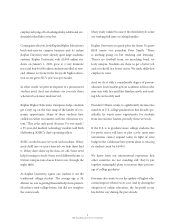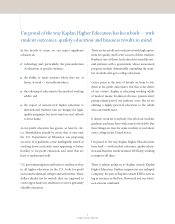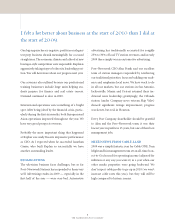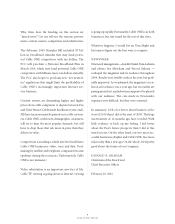Washington Post 2009 Annual Report Download - page 18
Download and view the complete annual report
Please find page 18 of the 2009 Washington Post annual report below. You can navigate through the pages in the report by either clicking on the pages listed below, or by using the keyword search tool below to find specific information within the annual report.Kaplan Higher Education has implemented initiatives to mitigate the increased risk of student loan defaults for Kaplan
University and Kaplan Higher Education Campuses’ students. Kaplan has dedicated resources focused on helping the
students who are at risk of default. Kaplan personnel contact students and provide assistance, which includes providing
students with specific loan repayment information, lender contact information and debt counseling. Kaplan has also
implemented a financial literacy and counseling program for current students and has refined and improved its student
retention programs, resulting in improved retention rates. Students who withdraw prior to program completion demonstrate
a higher loan default rate than those who continue through to graduation. Although Kaplan has dedicated resources to
mitigate the increased risk of student loan defaults by its students, there is no guarantee that such efforts will be successful.
The “90/10” Rule. Prior to the enactment of the Higher Education Opportunity Act, any for-profit postsecondary
institution (a category that includes all of the schools in Kaplan Higher Education) would lose its Title IV eligibility for at
least one year if more than 90% of the institution’s receipts for any fiscal year were derived from Title IV programs, as
calculated on a cash basis in accordance with the Federal Higher Education Act and applicable Department of
Education regulations. Under amendments to the Federal Higher Education Act, a for-profit institution loses its eligibility to
participate in the Title IV programs for a period of at least two fiscal years if the institution derives more than 90% of its
receipts from Title IV programs for two consecutive fiscal years, commencing with the institution’s first fiscal year that ends
after August 14, 2008. An institution with Title IV receipts exceeding 90% for a single fiscal year ending after August 14,
2008, will be placed on provisional certification and may be subject to other enforcement measures. The 90/10 Rule
calculations are performed for each OPEID unit. The largest OPEID reporting unit in Kaplan’s Higher Education division in
terms of revenue is Kaplan University, which accounted for approximately 61% of the Title IV funds received by the
division in 2009. In 2009, Kaplan University derived less than 87.5% of its receipts from the Title IV programs, and other
OPEID units derived an average of less than 83% of their receipts from Title IV programs, with no unit deriving more than
88% of its receipts from such programs.
The proportion of Kaplan Higher Education’s revenue from certificate and associate degree programs is composed of a
higher percentage of Title IV funds than is the case for its bachelor’s and other degree programs. A majority of Kaplan
Higher Education students are enrolled in certificate and associate degree programs. Kaplan Higher Education is taking
various measures to reduce the percentage of its receipts attributable to Title IV funds, including emphasizing direct-pay
and employer-paid education programs, encouraging students to carefully evaluate the amount of Title IV borrowing, and
developing additional professional development and continuing education programs. Although Kaplan is taking steps to
address compliance with the 90/10 Rule, there can be no guarantee that these measures will be adequate to prevent the
90/10 Rule calculations from exceeding 90% in the future.
Regulations Regarding Disbursement or Retention of Title IV Funds. The Department of Education may fine a school,
require a school to repay Title IV program funds, limit or terminate a school’s eligibility to participate in the Title IV
programs, initiate an emergency action to suspend the school’s participation in the Title IV programs without prior notice
or opportunity for a hearing, transfer a school to a method of Title IV payment that would adversely affect the timing of the
institution’s receipt of Title IV funds, deny or refuse to consider a school’s application for renewal of its certification to
participate in the Title IV programs, refer a matter for possible civil or criminal investigation or take other enforcement
measures if it finds that the school has failed to comply with Title IV requirements or improperly disbursed or retained Title
IV program funds. In addition, there may be other legal theories under which a school could be sued as a result of
alleged irregularities in the administration of student financial aid.
Change of Control. Each Kaplan Higher Education school is certified to participate in Title IV programs. Pursuant to
Title IV program regulations, a school that undergoes a change in control, which may include a change in control of a
school’s parent corporation or other owners, must be reviewed and recertified by the Department of Education and obtain
approvals from certain state agencies and accrediting bodies, in some cases prior to the change of control. Certifications
obtained from the Department of Education following a change in control are granted on a provisional basis that permits
the school to continue participating in Title IV programs, but provides fewer procedural protections if the Department of
Education asserts a material violation of Title IV requirements.
Standards of Financial Responsibility. An institution participating in the Title IV programs must comply with certain
measures of financial responsibility under the Higher Education Act and under Department of Education regulations.
Among other things, the applicable regulations require an institution to achieve a composite score of at least 1.5 as
calculated under Department of Education regulations based on data in annual financial statements submitted to the
Department of Education. If an institution fails to achieve a composite score of 1.5 or fails to comply with other financial
responsibility standards, the Department of Education may place conditions on the institution’s participation in the Title IV
programs and may require the institution to submit to the Department of Education a letter of credit in an amount of at least
10% to 50% of the institution’s annual Title IV participation for its most recent fiscal year. The Department of Education has
4THE WASHINGTON POST COMPANY
























